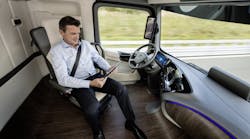Consumers still leery of self-driving vehicles ... as are truckers
It doesn’t surprise me that many motorists still aren’t fans of self-driving vehicles (count me in their corner). And it’s also not surprising that truckers don’t like autonomous driving systems, either – even as both they and motorists alike continue to favor connected vehicle technology in ever-greater numbers, largely for safety benefits.
What IS surprising about the findings from a new survey conducted by real-time information systems provider Solace is that Millennials – the supposed can’t-live-without-technology generation, the ones who also apparently don’t want to drive vehicles at all – are suspicious of self-driving systems.
Solace polled 1,500 U.S. online consumers who identified as connected car drivers across a wide age range and found, as a group, 57% of them would not buy a self-driving car, even if cost weren't an issue.
When it comes to safety, almost two-thirds (62%) of drivers surveyed by Solace believe they drive safer in connected cars, but when asked what type of decisions they would not trust their connected car to make, 40% noted they wouldn't trust their car to brake for them – and only 9% said they “always trust” their connected car to start with.
Now here’s the ironic twist: Examining responses by generation, Solace found that younger drivers, counterintuitively, are more hesitant to hand over the driving controls than older generations. Almost half (46%) of Millennials aged 18 to 25 would not trust their car to automatically react to driving conditions, whereas only a third of drivers 65 or older felt that way.
"The automotive industry is focused on bringing self-driving cars to the mass market, but our survey showed that connected car drivers of all ages just aren't ready to hand over the wheel," noted Shawn McAllister, chief technology officer for Solace, in a statement. "While advancements in autonomous vehicle technologies are incredibly exciting, it's important to keep an understanding of the consumer front and center. We hope our survey will help in this regard."
Trucking CEOs have also expressed feelings similar to those consumers polled by Solace, as noted during a recent panel discussion at NATSO Connect 2018 in Nashville, TN; the annual convention of the trade group formerly known as the National Association of Truck Stop Operators.
Dean Newell, vice president of safety and training for flatbed fleet Maverick Transportation and Dave Manning, president of TCW Inc. and the currently chairman of the American Trucking Associations (ATA) both stressed that fully autonomous trucks simply won’t work in the freight business – a least in the over-the-road sector.
“I don’t ever think we’ll see them on the highway,” said Newell. “We’ll see them in certain applications, like mining trucks and things like that. But as far as over-the-road operation I don’t think we’ll see it in my lifetime. They will be more autonomous, but not driverless; we will still need people in there.”
Manning added that drivers “just perform too much other vital work aside from driving,” he explained, citing the tarping down of flatbed loads, handling intermodal container exchanges, conducting vehicle safety inspections, and managing hazardous material shipments.
“They do way more than simply refuel and drive trucks,” Manning said. “And when does technology work 100% of the time? All systems have flaws and a driver needs to be there to go ‘old school’ in case a problem with the technology occurs.”
Newel added that the “skills sets” professional truck drivers bring to the table are also critical to operating big rigs safely in bad weather or in emergency situations as when a tractor-trailer blows a tire.
Solace’s survey also provided some other interesting insights from motorists about connected and self-driving vehicle systems, ones that are probably shared to some degree by truckers as well:
- When it comes to connected car capabilities, safety and navigation features are the most trusted and valued for U.S. drivers.Half (49%) of U.S. drivers are most likely to rely on safety sensors – such as lane departure alerts – in a connected car; while one in three (35%) are most likely to rely on navigational driving prompts. One in four drivers (26%) also believe navigation is the most valuable connected feature for their driving needs; while 20% selected safety monitors as the most valuable connected feature.
- Connected car drivers aren't overly dependent on apps when they drive, but app performance impacts their driving experience.When asked how many applications connected car drivers depend on while driving, over half (53%) of respondents noted they use only one to two applications while driving, while less than three percent noted they use more than five. Examining driver frustrations when it comes to features in their connected car, roughly 15% said that if an app they're using froze or stalled while they were driving it would create a poor driving experience. Additionally, almost one in five (18%) noted they become frustrated while driving if an app provides incorrect information.
- Most consumers don't know what happens to their data in a connected car. While data storage has become a growing concern for connected cars, especially those in the rental market, Solace found that almost half of connected car drivers (48%) weren't aware that their vehicle could store their personal data, such as their home address, social security number, birthday, etc.
Those are all issues worth thinking about as cars and trucks continue to become more computerized with every new model introduction.



